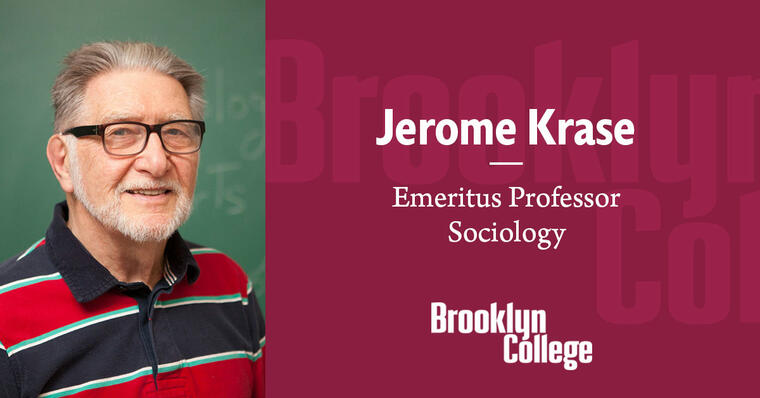Lectures of prof. Jerome Krase, Fulbright scholar

Lectures of prof. Jerome Krase, Fulbright scholar
1. Revisiting Seeing Cities Change: Local Culture and Class
Open Seminar: Charles University, Faculty of Social Sciensces, Prague 5, Jinonice, U Kříže 8, Room B216
Date tand time : Tuesday, June 4, 2024, 14:00 – 15:20
Annotation: When we pass through urban spaces such as a residential neighborhood we haven’t visited before, we are like tourists using our eyes to decipher the clues and cues that loudly and quietly surround us. We might ask ourselves, Is this a safe or a dangerous place? Am I welcome here,
or should I leave before it is too late? What kind of neighborhood is it? Are the people who live
here rich or poor? What is their race, ethnicity, or religion and how (or why) does it matter?
Some things are easy to tell on a street, such as whether there are things for sale. Legitimate
merchants make it obvious that they are seeking customers with signs that compete for
attention, but for the sale of illicit goods, the signs vendors give off are subtler. Yet it seems
that for the knowledgeable customer, they are in plain view. This reading of the “street signs,”
so to speak, is not merely an aesthetic exercise. What we see makes a difference in how we
respond to the places and the people we encounter in our increasingly complex and changing
urban surroundings. In this visually enhanced presentation, we will explore sites and sights
around the globe.
2. Visible Means of Support
Public seminar held in: Dům národnostních menšin Vocelova 302/3, Praha 2, Vinohrady
Date and time: 31. 5. 2024, from 9:00 to 10:30
Annotation of the presentation: As noted by Peirce K. Lewis writing about the axioms of the American cultural landscape “...all human landscape has cultural meaning, no matter how ordinary that landscape may be.” So it follows that we can “read the landscape as we might read a book.” Naturally this applies to all human landscapes which are “...our unwitting autobiography, reflecting our tastes, our values, our aspirations, and even our fears, in tangible, visible form.” In this visually enhanced presentation, I hope to convincingly demonstrate how support for or against important public issues is shown in what John Brinckerhoff Jackson called “vernacular landscapes,” – that which
“...lies underneath below the symbols of permanent power expressed” in the “Political
Landscape.” These visible forms, or as I have ironically phrased it, “Visible Means of Support”
are expressed in many ways such as demonstrations and signage. Among the many public issues
addressed here are the COVID-19 Pandemic, the October 7th Hamas attack on Israel, and the
response by Israel in Gaza. Of course, the most pertinent issue given the “Local and Global
Impacts of the War in Ukraine” conference here at Charles University, is support for Ukraine
after the invasion by Russia.
ABOUT LECTURER:
Professor Jerome Krase, PhD, Emeritus and Murray Koppelman Professor, Brooklyn College
of the City University of NewYork.
He is an urban sociologist but has also a background in history and philosophy. He was
Brooklyn-born and raised and is a U.S. Army veteran, having served from 1963 to 1966. As an
acvist-scholar, he has worked with and studied a wide variety of city-wide organizations as well as
neighborhood and ethnic groups in New York City, especially in Brooklyn. He is the president
of the European Academy of Sciences of Ukraine (EUASU), which is a non-governmental
organization, the main purpose of which is to pursue the promotion and advancement of science
and scholarship in Ukraine and worldwide (https://euasu.org/). In addition to his connections to
the Ukrainian diaspora, he also studied Italian and other diasporas worldwide. He is media-
savvy, having worked with Radio Free Europe, for example. One of his specializations is visual
sociology. In addition to being able to assemble scholars to help achieve the project's goals, he
is an experienced editor who ensures the quality of the publication output. He has edited many
publications for Palgrave and Routledge and is co-editor of the Scopus journal Urbanities,
Journal of Urban Ethnography.

